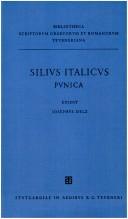| Listing 1 - 3 of 3 |
Sort by
|

ISBN: 3519018047 9783598718045 3598718047 3110976129 9783110976120 9783519018049 Year: 1987 Publisher: Stuttgart: Teubner,
Abstract | Keywords | Export | Availability | Bookmark
 Loading...
Loading...Choose an application
- Reference Manager
- EndNote
- RefWorks (Direct export to RefWorks)
No detailed description available for "Sili Italici Punica".
Classical Latin literature --- Punic War, 2nd, 218-201 B.C. --- Epic poetry, Latin. --- Guerre punique, 2e, 218-201 av. J.-C. --- Poésie épique latine --- Poetry. --- Poésie --- Carthage (Extinct city) --- Rome --- Carthage (Ville ancienne) --- Poetry --- History, Military --- Histoire militaire --- Punic War, 2nd, 218-201 BC --- Epic poetry, Latin --- -Punic wars --- Latin epic poetry --- Latin poetry --- -Rome --- Carthage (Ancient city) --- Carthago (Extinct city) --- Kart Hadasht (Extinct city) --- Qarțājannah (Extinct city) --- Tunisia --- -Poetry. --- Antiquities --- -Poetry --- -Latin epic poetry --- Punic wars --- Poésie épique latine --- Poésie --- Rim --- Roman Empire --- Roman Republic (510-30 B.C.) --- Romi (Empire) --- Punic War, 2nd, 218-201 B.C --- Byzantine Empire --- Rome (Italy) --- Punic War, 2nd, 218-201 BC - Poetry --- Carthage (Extinct city) - Poetry --- Rome - History, Military - 265-30 BC - Poetry
Book
ISBN: 351901839X 359871839X 9783519018391 Year: 1983 Volume: 2/3 Publisher: Stuttgart: Teubner,
Abstract | Keywords | Export | Availability | Bookmark
 Loading...
Loading...Choose an application
- Reference Manager
- EndNote
- RefWorks (Direct export to RefWorks)
Book
ISBN: 1282911902 9786612911903 3110239086 9783110239089 9783110224191 3110224194 Year: 2010 Publisher: Berlin: de Gruyter,
Abstract | Keywords | Export | Availability | Bookmark
 Loading...
Loading...Choose an application
- Reference Manager
- EndNote
- RefWorks (Direct export to RefWorks)
The life and deeds of Gnaeus Iulius Agricola ? governor of the Roman province of Britannia under the Flavian emperors ? are best retold by his son-in-law, Tacitus. Tacitus describes not only the successful Roman campaigns in Britannia, but also the characteristics of the country. Thus, his Agricola is one of most elemental sources for the study of the history andinner structure of this northernmost Roman province.
Statesmen --- Agricola, Gnaeus Julius, --- Agricola, Cn. Julius, --- Agricola, Julius, --- Agricola, Cn. Julius --- Agricola, --- Rome --- History --- Rome - History - Julio-Claudians, 30 BC-68 AD --- Britannia /1st century. --- Gnaeus Iulius Agricola. --- Roman History. --- Tacitus, Cornelius.
| Listing 1 - 3 of 3 |
Sort by
|

 Search
Search Feedback
Feedback About UniCat
About UniCat  Help
Help News
News